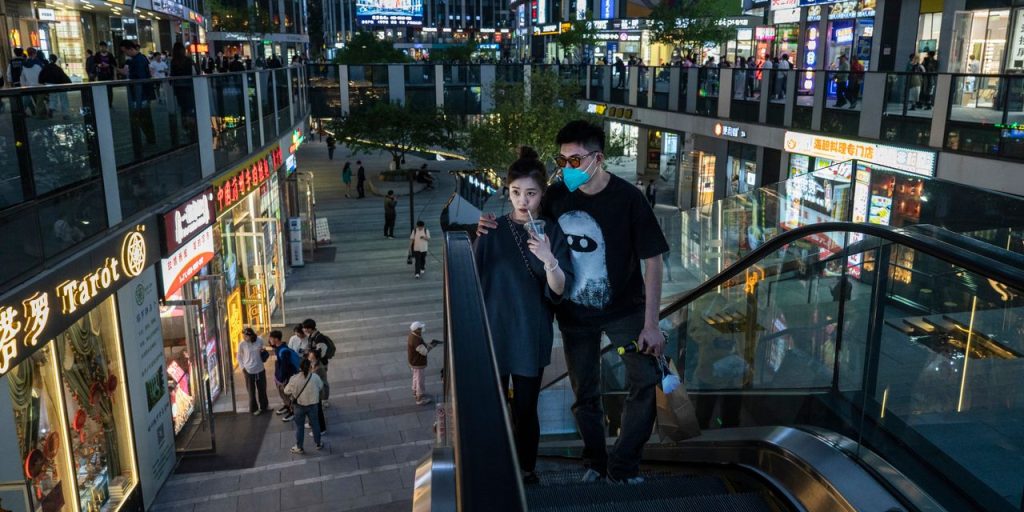China’s economic recovery has given off mixed signals and confounded investors since authorities scrapped so-called zero-COVID measures in December. But one thing was crystal clear in Tuesday’s official data: Domestic consumption is roaring.
Explosive growth in the retail sector last month helped drive expansion in the country’s overall economy, according to data released by the National Bureau of Statistics.
Retail sales — a gauge of domestic consumption — jumped 10.6% in March as compared with the same period last year. This was the biggest gain in 20 months and well above economists’ consensus projection.
“It is much better than expected,” said Hong Hao, chief economist at GROW Investment Group. “It suggests that the Chinese consumer is bouncing back,” he told MarketWatch from Hong Kong.
From the archives (January 2023): A bang or a whimper? Chinese consumers face first restriction-free Lunar New Year since start of pandemic.
Also see (January 2023): Optimism has been returning to China’s economy — but can it last?
Those robust numbers helped lift China’s broader economy, which expanded 4.5% in the first quarter — a sharp acceleration from the 2.9% economic growth in the last quarter of 2022, according to official data.
The news was eagerly welcomed. China in December ended three years of stringent COVID restrictions that interfered with shopping, work and travel. The country’s economy expanded at only 3% in 2022, far short of the government target of 5.5%. Consumption was hit particularly hard.
In last month’s rebound, sales were strongest for dining, tobacco and alcohol, clothing, and medicines, which all notched double-digit growth. Online sales accounted for one-quarter of all consumer goods sold in March, officials said.
But sales of luxury goods were even stronger. Moët Hennessy Louis Vuitton SE
MC,
+0.18%
LVMHF,
+1.17%,
the French company that owns Louis Vuitton, Dior and Tiffany and is the largest luxury-goods conglomerate in the world, last week reported a 17% rise in first-quarter sales, far exceeding analysts’ expectations.
The group, whose performance often serves as an indicator for the broader luxury sector, fingered the lifting of China’s pandemic-oriented restrictions as a factor. And it wasn’t alone in posting its top-shelf revenue increase.
See: Bernard Arnault, now worth $210 billion, has extended his lead over Elon Musk on the global billionaires list
Porsche
DRPRY,
-0.47%
PAH3,
-0.57%
broke its year-on-year sales record in the first quarter, with 18% growth worldwide led by a 21% increase in China, its largest market, the company reported Monday.
Rising property sales are also putting a firmer floor under the recovery. Home prices in China rose in March for the second month in a row, after an atrocious performance through much of last year.
And travel is bouncing back. China’s air-passenger numbers jumped 68.9% on a year-on-year basis in the first quarter, hitting 80% of the traffic level of the same period in prepandemic 2019, the aviation regulator said Tuesday.
Beijing animation producer Lili Yu played a part in both of those upticks, she said. The 36-year-old bought an apartment in the capital last month and said she will vacation in Australia for the first time next week.
“I feel more secure about my job and my industry,” she told MarketWatch.
But all is rarely well across the whole of the massive Chinese economy. Industrial production, a traditional engine of growth, fell short of expectations with a 3.9% increase in March. Growth in fixed-asset investment softened to 5.1% in the first three months from 5.5% in the first two months of the year.
MarketWatch Metrics: India has just supplanted China as the world’s most populous country. But this demographic metric is more important for its economy.
Even unemployment, which improved to 5.3% last month from 5.6% in February, was overshadowed by a nagging rise in youth joblessness — workers aged 16 to 24 — which hit nearly 20%.
Chinese officials expressed caution about interpreting the robust retail sales too optimistically. Fu Linghui, spokesperson for the statistics bureau, on Tuesday said the international economic environment remains “unstable and uncertain” and China’s consumption rebound was still “insufficient.”
“It is worth remembering that we had [consumer price index] deflation and negative import growth this month, and so there is still reason to be concerned with the strength of a consumption rebound,” said economist Michael Pettis, a senior fellow at the Carnegie Endowment.
“I am hoping to see strong consumption numbers in the next two months to confirm,” he told MarketWatch from Beijing.
Even GROW Investment’s Hong tempered his optimism with a caveat on retail spending: “If it’s revenge consumption, then there is a one-off component in today’s figure and it’s unlikely to carry on at such [a] rate,” he said.
From the archives (November 2022): China’s Xi faces wave of public anger over draconian ‘zero COVID’ rules
Also (December 2022): After three years of quarantine China’s fight to normalize now faces rising infections
Read the full article here




